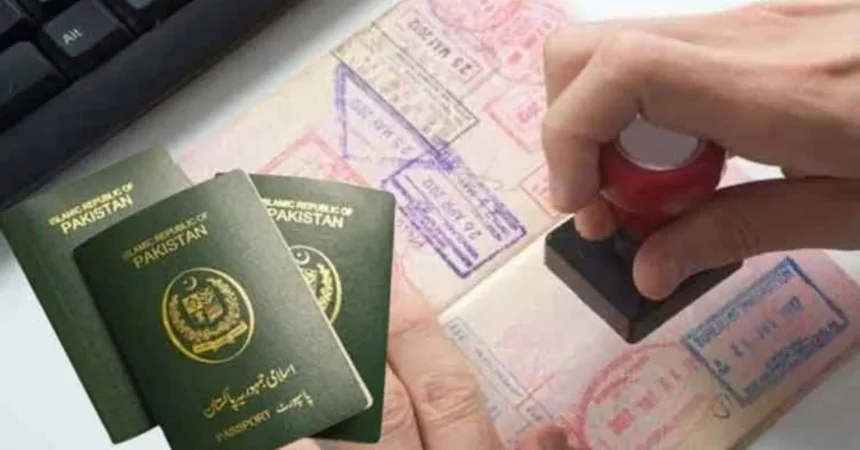The issuance of visas to 82 Pakistani pilgrims by India marks a significant development in the realm of religious tourism and diplomatic relations between the two neighboring countries. This decision is particularly relevant given the historical and cultural ties that bind India and Pakistan. Such moves not only foster goodwill but also provide an opportunity for interfaith dialogue and understanding.
Context of the Visa Issuance
On October 19, 2024, the Indian government announced that it had granted visas to 82 Pakistani pilgrims, enabling them to visit various religious sites across India. This decision was welcomed by the pilgrims and their families, who often face challenges when seeking to travel between the two nations. The pilgrims are primarily traveling to visit important religious sites, reinforcing the significance of these journeys.
Significance of Religious Pilgrimages
For many individuals, religious pilgrimages represent not only a spiritual obligation but also a deeply personal journey. The issuance of visas for Pakistani pilgrims allows them to connect with their faith at prominent sites such as the Golden Temple in Amritsar and the Ajmer Sharif Dargah. These visits provide an opportunity for spiritual reflection and communal worship, fostering a sense of belonging and unity among believers.
A Historical Perspective
The relationship between India and Pakistan has been marked by historical tensions, but religious pilgrimages have often acted as a bridge between the two nations. Historically, both countries have seen exchanges of pilgrims that reflect the shared cultural and religious heritage. This visa issuance is a continuation of that tradition, reinforcing the idea that faith can transcend borders and foster dialogue among communities. It emphasizes the potential for peaceful interactions, even amidst political challenges.
Addressing Travel Challenges
Despite the excitement surrounding this visa announcement, the challenges faced by Pakistani pilgrims cannot be overlooked. Many individuals encounter hurdles such as complicated visa application processes, political tensions, and logistical issues related to travel. By addressing these challenges, both governments can create a more welcoming environment for pilgrims, encouraging further exchanges that promote understanding and respect among different faiths.
Potential for Future Collaborations
The issuance of these visas signals a willingness on both sides to engage in cultural exchange and cooperation. With this in mind, there is potential for expanded efforts in religious tourism. Future collaborations could include joint initiatives to enhance the pilgrimage experience, such as streamlined visa processes and organized tours that promote interfaith dialogue. By capitalizing on these opportunities, India and Pakistan can build a framework for ongoing cultural and spiritual exchanges.
Importance of Religious Tourism
Religious tourism has long been a bridge between cultures, allowing individuals to explore and engage with different faiths. For Pakistani pilgrims, sites such as the Golden Temple in Amritsar, the Ajmer Sharif Dargah, and Varanasi’s Kashi Vishwanath Temple hold deep spiritual significance. These sites attract millions of devotees each year, serving as focal points for interfaith understanding.
- Amritsar – Harmandir Sahib (Golden Temple)
- The Golden Temple is one of the holiest places in Sikhism and is renowned for its stunning architecture and serene ambiance. It attracts pilgrims from various faiths, promoting a spirit of unity and peace.
- Ajmer – Ajmer Sharif Dargah
- The Dargah of Khwaja Moinuddin Chishti in Ajmer is a major pilgrimage site for Muslims. The shrine attracts followers from all backgrounds, highlighting the importance of spiritual unity.
- Varanasi – Kashi Vishwanath Temple
- This ancient city is considered one of the holiest places for Hindus, and the Kashi Vishwanath Temple is a key site of worship. Pilgrims from various regions travel here, emphasizing the shared cultural heritage.
Challenges Faced by Pakistani Pilgrims
Despite the significance of these religious sites, Pakistani pilgrims often encounter numerous obstacles when seeking to visit India. These challenges include:
- Visa Processes: The visa application process can be lengthy and complicated, leading to frustration among potential pilgrims.
- Political Tensions: Ongoing political disputes can create an atmosphere of uncertainty, impacting the willingness of individuals to travel.
- Safety Concerns: Concerns over safety and security can deter some pilgrims from making the journey.
- Financial Constraints: The costs associated with travel, accommodation, and other expenses can be prohibitive for many pilgrims.
- Limited Travel Options: The availability of transport routes may be restricted, making travel logistics more challenging.
- Cultural Differences: Navigating different customs and cultural practices can be daunting for some pilgrims.
- Health and Medical Issues: Concerns about access to medical care and health facilities during the journey can create apprehension.
- Inadequate Support Services: Lack of guidance or support for pilgrims during their travels can lead to confusion and stress.
- Restrictions on Movement: Local restrictions or curfews can complicate travel plans and schedules.
- Language Barriers: Communication difficulties can hinder the ability to seek help or information while traveling.
The Role of Government and Institutions
Governments play a crucial role in facilitating pilgrimages between countries. The recent visa issuance reflects a willingness on both sides to promote religious tourism and foster goodwill. Various organizations, including religious institutions and NGOs, also contribute by assisting pilgrims with the logistics of their journeys. Here are additional ways these entities can help:
- Streamlined Communication: Establish clear channels for communication between governments to facilitate faster decision-making.
- Joint Task Forces: Create collaborative bodies to oversee pilgrimage arrangements, ensuring both nations contribute equally.
- Cultural Exchange Programs: Encourage exchanges that allow pilgrims to experience both countries’ cultures.
- Infrastructure Development: Invest in transport and accommodation facilities to support increased pilgrimage activities.
- Emergency Support Services: Develop rapid-response teams to assist pilgrims in distress during their travels.
- Training Programs for Pilgrimage Guides: Offer training for local guides to enhance the travel experience for pilgrims.
- Policy Frameworks: Establish legal frameworks to protect pilgrims’ rights and ensure their safety during visits.
- Health and Safety Protocols: Implement health guidelines to ensure safe travel, particularly during pandemics or health crises.
- Financial Assistance Programs: Provide financial aid or subsidies for low-income pilgrims to enable participation.
- Cultural Sensitivity Training: Offer training for officials to ensure respectful treatment of pilgrims from different backgrounds.
- Community Engagement Initiatives: Involve local communities in pilgrimage activities to foster goodwill and support.
- Media Outreach: Utilize media platforms to share positive stories of cross-border pilgrimages, highlighting shared values and experiences.
- Technology Integration: Use technology to provide real-time updates on travel conditions and safety information.
- Monitoring and Evaluation: Regularly assess pilgrimage programs to identify areas for improvement and success stories.
- Partnerships with NGOs: Collaborate with non-governmental organizations to provide logistical support and enhance the pilgrimage experience.
Impact on Bilateral Relations
The issuance of visas for Pakistani pilgrims is not merely a logistical matter; it represents a step towards improving bilateral relations between India and Pakistan. Religious tourism can serve as a catalyst for fostering dialogue and understanding between the two nations. Instances of cooperation in this domain have previously contributed to easing tensions and creating a more positive atmosphere.
Future Prospects for Pilgrimages
Looking ahead, there is potential for increased collaboration between India and Pakistan in facilitating religious tourism. This could involve:
- Joint Initiatives: Both governments could work together to create joint pilgrimage initiatives that promote religious tolerance and cooperation.
- Technological Advancements: Leveraging technology to enhance the pilgrimage experience, such as online visa applications and travel arrangements, could make the process smoother.
The recent issuance of visas to 82 Pakistani pilgrims by India is a hopeful sign of improving relations between the two countries. As religious tourism continues to thrive, it offers an avenue for individuals from both nations to engage in meaningful exchanges and promote mutual understanding. By overcoming challenges and building upon these connections, India and Pakistan can foster a more harmonious relationship.
#IndiaPakistan #ReligiousTourism #CulturalExchange #Pilgrimage #BilateralRelations







